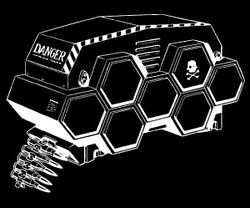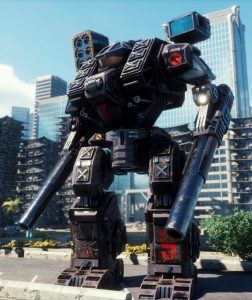Difference between revisions of "Cellular Ammunition Storage Equipment"
Tags: mobile edit mobile web edit |
|||
| (56 intermediate revisions by 8 users not shown) | |||
| Line 10: | Line 10: | ||
IS = [[3036]]<ref name="TMp210"/> | IS = [[3036]]<ref name="TMp210"/> | ||
| Year Introduced = | | Year Introduced = | ||
| − | Clan = [[2825]] [[Clan | + | Clan = [[2825]] [[Clan Coyote|CCY]]<ref>''Interstellar Operations'', p. 39, "Universal Technology Advancement Table"</ref> |
| − | IS = [[ | + | IS = [[2452]] [[Terran Hegemony|TH]]<ref name="IOp71">''Interstellar Operations'', p. 71, "CASE-P"</ref> |
| Year Extinction = | | Year Extinction = | ||
IS = [[2840]] <ref name="TMp210"/> | IS = [[2840]] <ref name="TMp210"/> | ||
| Line 24: | Line 24: | ||
| Tons = | | Tons = | ||
Clan = 0 | Clan = 0 | ||
| − | IS = 0 | + | IS = 0.5 |
| Critical Slots = | | Critical Slots = | ||
Clan = 0 | Clan = 0 | ||
| Line 33: | Line 33: | ||
}} | }} | ||
| + | == Description == | ||
| + | '''CASE''', short for '''Cellular Ammunition Storage Equipment''', was pioneered by the [[Terran Hegemony]] in the [[twenty-fifth century|mid-twenty-fifth century]] in order to prevent the complete destruction of a unit in the event of an internal explosion. Earlier [[Age of War]] [[BattleMech]]s and [[Combat Vehicle|combat vehicles]] had a tendency to be destroyed much more easily, due to the hazards of carrying volatile or explosive equipment, especially ammunition. CASE was designed to redirect internal explosions away from the interior of combat units, thus saving most of the unit for salvage or even maintaining part of it's combat capabilities. However, early CASE prototypes (CASE-P) that first appeared in [[2452]] had a modest 33% failure rate due to a variety of early flaws<ref name=HRW179>''Historical: Reunification War'', p. 179, "CASE (CASE-P)"</ref><ref name="IOp71"/>. By [[2476]], these flaws were refined or removed, becoming the standard version of CASE thereafter.<ref name="TMp210">''TechManual'', p. 210, "Cellular Ammunition Storage Equipment (CASE)"</ref><ref name="IOp71"/> | ||
| − | + | When CASE is installed in a unit, the location with CASE combines two safeguards against internal explosions. The rear-facing, external armor and ammunition bin doors are mounted with fastenings designed to fail in the event of an internal explosion. Additionally, hardened [[Ferro-fibrous armor|ferro-fibrous-armored]] containers are used to physically store the explosive components.<ref name=TRO2750>''Technical Readout: 2750'', p. 12, "Cellular Ammunition Storage Equipment (CASE)"</ref> This places a high-threshold barrier for exploding ammunition reaching its equilibrium when escaping into the interior of the unit, and a very low-threshold barrier against reaching equilibrium when escaping outside the unit, effectively redirecting the blast of the explosion out of the unit. However, the ferro-fibrous containment for the ammunition is not perfect. If an explosive component in a CASE-protected location detonates, the location's internal structure is still damaged from the explosion, along with the armor in the stricken location, as the fastenings fail and the armor is blown off in the blast. However, any further damage from the blast exits out of the unit. While CASE is invaluable for preventing excessive internal damage, it does not stop ammunition explosions, and the unit will likely be crippled or nonfunctional, albeit repairable, as a result of venting the explosion. In addition, CASE may prevent excess injury or fatalities among pilots and/or crew, although they will still feel the shock of the explosion.<ref name=TRO2750/><ref name="TMp210"/><ref name="TRO:2750p12">''Technical Readout: 2750'', p. 12, "CASE"</ref><ref name="TRO:3050p221">''Technical Readout: 3050'', p. 221, "CASE"</ref> | |
| − | |||
| − | [[Inner Sphere]] CASE | + | While [[Inner Sphere]] CASE has to be built into the armor of a location, [[Clan]] CASE does not require any additional tonnage, nor does it take any addition space, because it is integrated into the armor.<ref name="TMp210"/><ref name="TRO:2750p12"/><ref name="TRO:3050p221"/> |
==Rules== | ==Rules== | ||
| − | |||
| − | + | <div class="gamerules"> | |
| + | For [[BattleMech]]s, locations protected by CASE take internal damage normally until all internal structure in the location is destroyed. Regardless of how much excess damage remains after destroying the location, all further damage is reduced to 0.<ref name="TWp133">''Total Warfare'', p. 133-4 , "CASE"</ref> The pilot or crew of the damaged unit still takes feedback damaged from the ammunition explosion.<ref>''Total Warfare'', p. 125</ref> | ||
| + | |||
| + | Inner Sphere CASE cannot be mounted in the arm or leg of a 'Mech. Clan CASE is automatically mounted on all units however, and is included, even in ammo bins in the arm or leg of a 'Mech. Inner Sphere CASE weighs half a ton and takes up one critical slot. Clan CASE is presumed to be mounted in all Clan 'Mechs unless otherwise noted, with no weight or critical space required.<ref name="TRO:2750p12"/><ref name="TRO:3050p221"/><ref name=TMp210>''TechManual'', p. 210, "Cellular Ammunition Storage Equipment (CASE)"</ref> | ||
| − | + | Mounting CASE in [[Combat vehicles|combat vehicles]] is notably different. ''All'' ammunition in combat vehicles are protected by a single, CASE-lined ammunition bunker in the body of the vehicle. Ammunition explosions in a CASE-protected combat vehicle apply all damage to the vehicle's rear-facing external armor, with 0 damage to the internal structure. The explosion will also cause a "Crew Stunned" effect.<ref name="TWp133"/><ref name=TWp194>''Total Warfare'', p. 194 , "Vehicular Critical Hits"</ref> | |
| − | <ref name="TWp133">''Total Warfare'', p. | + | </div> |
| − | == | + | ==Related Equipment== |
| − | CASE | + | * [[CASE II]] - Pioneered in the mid-[[thirty-first century]], CASE II offers improved protection from internal explosions compared with standard CASE. |
| − | + | ==Notes== | |
| − | + | * When first introduced in ''[[Technical Readout: 2750]]'', excess damage was applied to the rear, external armor of the CASE-protected location, per ''Technical Readout: 2750'', p. 12, "Cellular Ammunition Storage Equipment (CASE)". With the addition of Clan CASE, and the ability to mount CASE in the arms, external arm armor would take the excess damage from an explosion in an arm, as per ''Technical Readout: 3050'', p. 221, "Cellular Ammunition Storage Equipment (CASE)".<br>This was changed in later editions of BattleTech. In many cases, armor in the section would already be destroyed; otherwise, destruction of the internal structure effectively destroys the location, making accounting for the excess damage mostly academic, and unnecessary for the current game. Therefore, ''[[Total Warfare]]'', pp. 133–134, does not require any need for transferring excess damage to the external armor in BattleMechs. | |
| − | |||
| − | |||
| − | |||
| − | |||
| − | |||
| − | |||
| − | |||
| − | |||
| − | |||
| − | |||
| − | |||
| − | |||
| − | |||
| − | |||
| − | |||
| − | |||
| − | |||
| − | |||
| − | |||
| − | |||
| − | |||
| − | |||
| − | |||
| − | |||
| − | |||
| − | |||
| − | |||
| − | |||
| − | |||
| − | |||
| − | |||
| − | |||
| − | |||
| − | |||
| − | |||
| − | |||
| − | |||
| − | |||
| − | |||
| − | |||
| − | |||
| − | |||
| − | |||
| − | |||
| − | |||
| − | |||
| − | |||
| − | |||
| − | |||
| − | |||
| − | |||
| − | |||
| − | |||
| − | |||
| − | |||
| − | |||
| − | |||
| − | |||
| − | |||
| − | |||
| − | |||
| − | |||
| − | |||
| − | |||
| − | |||
| − | |||
| − | |||
| − | |||
| − | |||
| − | |||
| − | |||
| − | |||
| − | |||
| − | |||
| − | |||
| − | |||
| − | |||
| − | |||
| − | |||
| − | |||
| − | |||
| − | |||
| − | |||
| − | |||
| − | |||
| − | |||
| − | |||
| − | |||
| − | |||
| − | |||
| − | |||
| − | |||
| − | |||
| − | |||
| − | |||
| − | |||
| − | |||
| − | |||
| − | |||
==References== | ==References== | ||
| Line 156: | Line 60: | ||
==Bibliography== | ==Bibliography== | ||
| − | *''[[ | + | *''[[Historical: Reunification War]]'' |
| + | *''[[Interstellar Operations]]'' | ||
| + | *''[[TechManual]]'' | ||
*''[[Technical Readout: 2750]]'' | *''[[Technical Readout: 2750]]'' | ||
*''[[Technical Readout: 3050]]'' | *''[[Technical Readout: 3050]]'' | ||
*''[[Total Warfare]]'' | *''[[Total Warfare]]'' | ||
| + | |||
[[Category:Technology]] | [[Category:Technology]] | ||
[[Category:Equipment]] | [[Category:Equipment]] | ||
[[Category:Defensive System]] | [[Category:Defensive System]] | ||
Latest revision as of 19:01, 7 April 2024

| |
| Cellular Ammunition Storage Equipment (CASE) | |
| Production information | |
| Type | Equipment (Physical Enhancement) |
| Tech Base | Clan[1] |
| Year Availability | Clan = 2825 |
| Year Introduced | Clan = 2825 CCY[2] |
| Year Extinction | IS = 2840 [1] |
| Year Reintroduced | IS = 3036 DC[1] |
| Technology Rating | D |
| Availability Ratings | C/F/D |
| Technical specifications | |
| Heat | 0 |
| Tons | Clan = 0
IS = 0.5 |
| Critical Slots | Clan = 0
IS = 1 |
| Cost (unloaded) | 50,000 |
| BV (1.0) | C |
| BV (2.0) | C |
Description[edit]
CASE, short for Cellular Ammunition Storage Equipment, was pioneered by the Terran Hegemony in the mid-twenty-fifth century in order to prevent the complete destruction of a unit in the event of an internal explosion. Earlier Age of War BattleMechs and combat vehicles had a tendency to be destroyed much more easily, due to the hazards of carrying volatile or explosive equipment, especially ammunition. CASE was designed to redirect internal explosions away from the interior of combat units, thus saving most of the unit for salvage or even maintaining part of it's combat capabilities. However, early CASE prototypes (CASE-P) that first appeared in 2452 had a modest 33% failure rate due to a variety of early flaws[4][3]. By 2476, these flaws were refined or removed, becoming the standard version of CASE thereafter.[1][3]
When CASE is installed in a unit, the location with CASE combines two safeguards against internal explosions. The rear-facing, external armor and ammunition bin doors are mounted with fastenings designed to fail in the event of an internal explosion. Additionally, hardened ferro-fibrous-armored containers are used to physically store the explosive components.[5] This places a high-threshold barrier for exploding ammunition reaching its equilibrium when escaping into the interior of the unit, and a very low-threshold barrier against reaching equilibrium when escaping outside the unit, effectively redirecting the blast of the explosion out of the unit. However, the ferro-fibrous containment for the ammunition is not perfect. If an explosive component in a CASE-protected location detonates, the location's internal structure is still damaged from the explosion, along with the armor in the stricken location, as the fastenings fail and the armor is blown off in the blast. However, any further damage from the blast exits out of the unit. While CASE is invaluable for preventing excessive internal damage, it does not stop ammunition explosions, and the unit will likely be crippled or nonfunctional, albeit repairable, as a result of venting the explosion. In addition, CASE may prevent excess injury or fatalities among pilots and/or crew, although they will still feel the shock of the explosion.[5][1][6][7]
While Inner Sphere CASE has to be built into the armor of a location, Clan CASE does not require any additional tonnage, nor does it take any addition space, because it is integrated into the armor.[1][6][7]
Rules[edit]
For BattleMechs, locations protected by CASE take internal damage normally until all internal structure in the location is destroyed. Regardless of how much excess damage remains after destroying the location, all further damage is reduced to 0.[8] The pilot or crew of the damaged unit still takes feedback damaged from the ammunition explosion.[9]
Inner Sphere CASE cannot be mounted in the arm or leg of a 'Mech. Clan CASE is automatically mounted on all units however, and is included, even in ammo bins in the arm or leg of a 'Mech. Inner Sphere CASE weighs half a ton and takes up one critical slot. Clan CASE is presumed to be mounted in all Clan 'Mechs unless otherwise noted, with no weight or critical space required.[6][7][1]
Mounting CASE in combat vehicles is notably different. All ammunition in combat vehicles are protected by a single, CASE-lined ammunition bunker in the body of the vehicle. Ammunition explosions in a CASE-protected combat vehicle apply all damage to the vehicle's rear-facing external armor, with 0 damage to the internal structure. The explosion will also cause a "Crew Stunned" effect.[8][10]
Related Equipment[edit]
- CASE II - Pioneered in the mid-thirty-first century, CASE II offers improved protection from internal explosions compared with standard CASE.
Notes[edit]
- When first introduced in Technical Readout: 2750, excess damage was applied to the rear, external armor of the CASE-protected location, per Technical Readout: 2750, p. 12, "Cellular Ammunition Storage Equipment (CASE)". With the addition of Clan CASE, and the ability to mount CASE in the arms, external arm armor would take the excess damage from an explosion in an arm, as per Technical Readout: 3050, p. 221, "Cellular Ammunition Storage Equipment (CASE)".
This was changed in later editions of BattleTech. In many cases, armor in the section would already be destroyed; otherwise, destruction of the internal structure effectively destroys the location, making accounting for the excess damage mostly academic, and unnecessary for the current game. Therefore, Total Warfare, pp. 133–134, does not require any need for transferring excess damage to the external armor in BattleMechs.
References[edit]
- ↑ 1.0 1.1 1.2 1.3 1.4 1.5 1.6 1.7 1.8 TechManual, p. 210, "Cellular Ammunition Storage Equipment (CASE)"
- ↑ Interstellar Operations, p. 39, "Universal Technology Advancement Table"
- ↑ 3.0 3.1 3.2 Interstellar Operations, p. 71, "CASE-P"
- ↑ Historical: Reunification War, p. 179, "CASE (CASE-P)"
- ↑ 5.0 5.1 Technical Readout: 2750, p. 12, "Cellular Ammunition Storage Equipment (CASE)"
- ↑ 6.0 6.1 6.2 Technical Readout: 2750, p. 12, "CASE"
- ↑ 7.0 7.1 7.2 Technical Readout: 3050, p. 221, "CASE"
- ↑ 8.0 8.1 Total Warfare, p. 133-4 , "CASE"
- ↑ Total Warfare, p. 125
- ↑ Total Warfare, p. 194 , "Vehicular Critical Hits"


